
What is Quality of Life
Introduction
Since this is the first week, let’s talk about what I am invested in. I am currently investing in the Indian stock market. I have two reasons why. One, there is no capital gains tax for long term investments (over an year) in Indian stock market! Two, I can get some advice from my cousin, a Chartered Accountant in India (equivalent to CPA in USA) who is into value investing for over 5 years. There are two major companies I am invested in right now: KPIT Technologies and Divi’s Laboratories. We can talk about my rationale for picking these stocks in a later post.
Quality of Life
I am investing to improve my quality of life over the long term. How is investing impacting my quality of life over the short term? First of all, what is quality of life? The concept is quite abstract. I can only give you my own idea of it. I think quality of life is the emotional and mental state of oneself. So a high quality of life is to sustain wholesome emotional/mental states for most of the time. What are these wholesome states? I think they are non-reactivity (peace), vitality (energy and vigor), happiness or pleasure. All of these provide pleasantness. Any state that provides sustainable pleasantness is a wholesome state. I may keep coming back to this question over and over again. This question is hard to answer but very important to keep thinking about.
Recap of My Week
It’s summertime! No school. I am working 9-5 as an intern at Amazon. I was researching more about Divi’s Labs and some other companies which did not meet the bar to go deeper into research. This week, I noticed that I am forming a habit of checking the stock market as soon as I wake up. I think it is natural but I should not let it get worse. However, I am spared from worrying about the price action throughout the day because the Indian stock market closes way before I wake up and opens about the time I sleep. I count myself fortunate for that because a value investor has nothing to do with day-to-day price movements.
Tip of the Week
I was listening to Mohnish Pabrai’s talk at Google this week. I resonated with his idea of finding high uncertainty but low risk investments. For example, taking a semester off to turn an idea into a startup is rigged with a lot of uncertainty. However, the risk is quite low for me because I do not have many bills to pay or anybody depending on me. Moreover, I will have something to show on my resume. So the worst case scenario is bearable whereas the best case can be that I am financially free in a few years. My tip is to think about all of your decisions in this way. Many successful people made it by taking such decisions.
